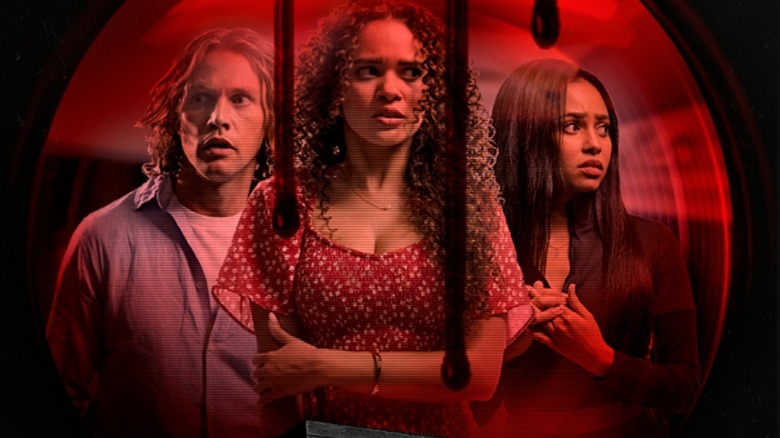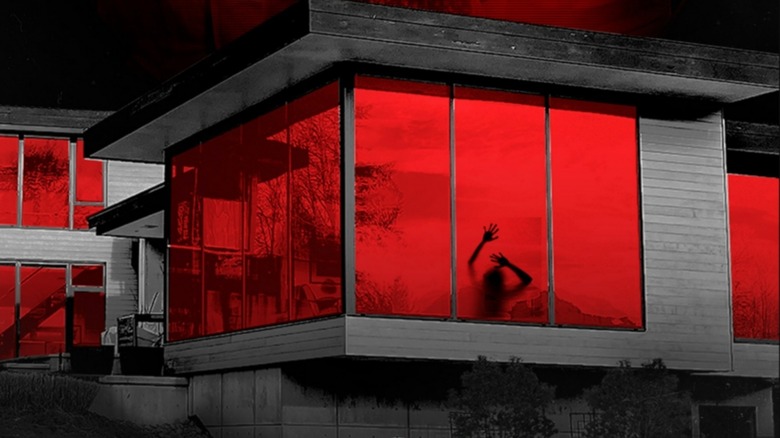Margaux Review: Feel Free To Ignore The Call Coming From Inside This Smart House
At its best, horror seeks to move us, entertain us, scare our pants off and elicit similar kinds of thrills as roller coasters do. But for those that aim a little higher — no, not in an "elevated horror" sort of way (whatever that means), but simply in terms of ambition — there's also an added responsibility to sneak in some clever observations about our world that we've generally taken for granted, done in ways that other genres simply aren't capable of accomplishing. In other words, with copious amounts of blood, guts, and gnarly kills.
When a particular movie or show manages to hit all those pleasure centers in our impressionable brains, it elicits the kind of cathartic responses found in something like Jordan Peele's deeply provocative "Nope." When an otherwise promising piece of horror media stumbles in that pursuit, well, let's just say that things can go sideways pretty quickly.
For better or worse, the first five schlocky minutes of "Margaux," directed by Steven C. Miller ("Arsenal," "Line of Duty") from a script by Chris Beyrooty and Nick Waters, tells you everything you need to know. Walking viewers through a rushed and painfully uninspired setup, the mini-prologue involves a well-to-do couple in a decadent futuristic home; the promise of an intimate evening on the horizon; and a sudden, shocking, but underwhelmingly banal double-murder that sets the tone for what's to come in the following story. Believe it or not, the culprit appears to be ... the smart house itself (or, more accurately, its malicious artificial intelligence).
No, rest assured that "Margaux" doesn't take very long to announce where in the horror swimming pool it's content to reside. This movie isn't paddling around in the shallows, mind you — not with its R-rated kills, occasional stabs at social commentary, and a startling amount of cynicism threaded throughout the feature. But it most definitely won't be found in the deep end, either, possessing none of the cleverness, originality, nor daring to ever really assert itself.
Instead, viewers are left foundering somewhere in the middle, treading water right on that gradual slope at the midpoint where things could turn either way. Maddeningly enough, this is one film that will have you wishing you'd never stepped foot in that pool — or, more to the point, the smart house itself — in the first place.
Wasted potential
After its tenuous start, "Margaux" at least temporarily rights the ship when it introduces our core cast of victims-in-waiting.
The once-tightknit group of college seniors, highlighted by geeky coder Hannah (played by Madison Pettis, skillfully spinning even the direst dialogue into gold), blandly handsome ringleader Drew (Jedidiah Goodacre), and social media influencer and uninvited outsider, Lexi (Vanessa Morgan, injecting her best "Riverdale" energy into the proceedings to little avail), attempt to relive the glory days of freshman year with their smart house getaway. Taken together, they hit all the typical beats you'd expect from a B-movie slasher — there's also the horny couple (Jordan Buhat and Phoebe Miu, both of whom are sorely underused), the weed-obsessed slacker (a pitch-perfect Richard Harmon), and the three aforementioned leads who form an uninteresting and unconvincing love triangle — but the script derives at least a measure of energy from the somewhat refreshing group dynamic of onetime friends trying to recapture their old spark.
However, the potential of these broadly-sketched archetypes and the novelty of a killer smart house quickly drains from the picture once they arrive at their destination and meet the eponymous, female-coded AI Margaux. After a painfully drawn-out shot lingers on the front door as she locks our characters within the house, as if underlining the point for viewers who might be casually glancing up at the straight-to-VOD film in between social media check-ins, "Margaux" appears wholly uninterested in expanding on its colorful cast or even building any real sense of atmosphere.
Despite all the claustrophobic low-angle shots and the tension-inducing color palette, no amount of gruesome and bizarrely mean-spirited slayings allows the sinister house to develop a personality of its own ... even when a later development gives the disembodied AI a more tangible way to express herself and her motivations (such as they are). Although this gives the remaining cast a new and sorely-needed dimension to play with, turning the subtext into something much more literal, it's too little and too late to save "Margaux" from its own worst inclinations.
A social commentary with nothing to say
Most disappointingly of all, however, the filmmakers' ambitions to use "Margaux" as a vehicle to comment on social media and, more importantly, the subculture that has sprung up around it amounts to nothing. Margaux learns all she needs to know about her Insta-happy young victims from their online postings, a fate that the much more cautious and private Hannah avoids through her lack of an online presence altogether, but good luck trying to dig up any observation more insightful than, "Social media is bad, actually." Where a thriller like "Bodies Bodies Bodies" tempered its similarly Gen-Z viewpoint with an acerbic display of self-deprecating humor, "Margaux" is far more blunt, far more clumsy, and far less effective as a result.
By the time the third act devolves into a confused, monologue-heavy screed about logic, love, and the nature of humanity, featuring one bafflingly head-scratching kill and a twist that makes less sense the more you think about it, you might find yourself wishing that Margaux would put both her victims and ourselves out of our collective misery.
This is hardly the first time that filmmakers have attempted to fold anxieties about modern technology and filter it through a horror parable, of course. In fact, it's not even the first time such a premise featured this specific tech, as 1999's bizarrely ahead-of-its-time Disney Channel original "Smart House" proves. But when compared to recent entries in this subgenre of horror — nobody would come into this expecting the Alex Garland masterpiece "Ex Machina," but surely something along the lines of Leigh Whannell's low-budget "Upgrade" was attainable — "Margaux" stands out for just how flat, confused, and out of touch it feels.
Horror, like all storytelling, should be an iterative process, building on the achievements of what came before and remixing familiar ingredients into something new. But as much as the serial-killing AI claims to champion the need for evolution, the only idea this twisty home invasion flick inadvertently suggests is infinitely less novel than that. The more that movies explore this particular territory, the harder it gets to make truly great, original work. In that spirit, "Margaux" represents a cautionary tale ... just not quite the one it set out to be.
/Film Rating: 3 out of 10
"Margaux" will be available on digital on September 9.


